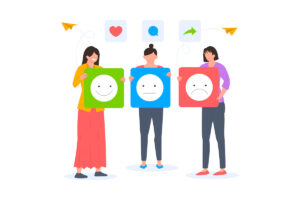Sometimes forgiveness can seem like an impossible concept. The emotions you feel around a certain scenario can make forgiveness feel like wading through a giant can of treacle. But instead of thinking of forgiveness in a ‘click your fingers’ style epiphany, it’s an action that can take a long time. Think of it as a journey that could even take years to reach a conclusion.
What does it take to forgive someone?
What is Forgiveness?
When you’ve been firmly positioned on the ‘other side’ of forgiveness and been desperately apologetic about a situation you’ve had a hand in, you can hold a naïve hope that ‘forgiveness’ means forgetting and moving on. In reality, when you’ve been wronged, in all likelihood, it’s not probable that you’ll forget what someone did any time soon and it doesn’t mean you’re willing to completely excuse someone else’s actions in a puff of magic smoke.
Understanding what forgiveness really means can help you to move towards it. Setting your own terms and boundaries can make forgiveness a more comfortable idea.
- You don’t have to completely forget someone’s actions and excuse their behavior.
- Forgiveness isn’t about a grand gesture or a ceremonial, cinematic vow of forgiveness – you don’t have to tell the other person.
- Your feelings don’t cease when you ‘forgive’ someone, you can continue your emotional journey.
- Everything isn’t instantly completely fine – you and your family/friend will probably still need to work things out and repair your relationship.
- Forgiveness doesn’t equal forgetting.
- After you forgive, there’s no obligation to carry on having that person in your life.
- This is a personal act – forgiveness can be for yourself, you don’t owe it to someone else.
At a basic level, forgiveness should be a form of acceptance – acceptance that a situation happened and about searching for a way to move forward. Whether you include the other person in your process of forgiveness is up to you, but it’s a thing you should do for yourself and not someone else.
Barriers to Forgiveness
When you think about forgiveness as a personal act that helps you to move forward, it sounds ideal – why wouldn’t you do it? Well, the simple answer is emotion. Being ‘wronged’ by someone or let down can cause you to be angry, hurt and upset. These feelings can fester and be difficult to shift. They can also contort into feelings of revenge, retribution, and superiority, which can all be barriers to forgiveness.
Holding onto negative feelings can be exhausting and mentally taxing. Over time, it can begin to impact how you see the world, view yourself and others. It can become unhealthy.
It can be daunting to reach out and forgive and let someone know you’ve been hurt, but it can be a way of self-healing and self-care.
At the heart of forgiveness is willingness too. Are you actively opening yourself up to giving forgiveness or acknowledging within yourself that you want to move on. It can feel more comfortable and easy to hang onto negative feelings and have a ‘common enemy’ or demonize the person who hurt you – letting those feelings go or change can be an overwhelming and tricky thing to do.
There are some situations and feelings you can’t forgive as well and acknowledging that can be just as important as forgiveness. If a situation was too abusive or hurtful then you should only attempt to forgive when your heightened emotion has shifted or changed – that may never happen.
Deciding to forgive
How do you approach forgiveness and start to move to this stage? The first step is to acknowledge and accept what happened and why you were hurt and reacted in this way. Digging deep and thinking about the situation will help you to reflect on how it affected you and what happened.
Think about the repercussions of a scenario. Did you learn something about yourself and others after it happened? Did you have to create new boundaries or change your behavior in certain ways? Try to reflect on how an event impacted on your life positively and negatively.
Put yourself in the other persons’ shoes. Accept that everyone makes mistakes and try to reason as to why an event happened or what was going on with that person. Can you see reasons for why they did what they did – were there limitations and obstacles that influenced them? Why was this person so hurtful?
You also need to make a decision about whether you reach out to the other person or not. If you don’t, then try to make it into an event with yourself – write down your thoughts and feelings or confide in a close friend or family member. Externalize the forgiveness.
Moving On
Forgiveness, in whatever form it comes in helps you to move into a new phase. You can move on from what caused you anguish and pain.
It’s unlikely you’ll forget what happened, but you can decide that it won’t have as big an impact on your life and have control over you. Forgiving is allowing yourself to live and take a step forward.





